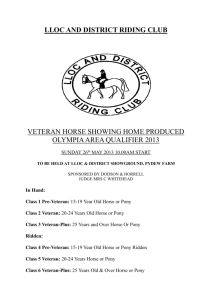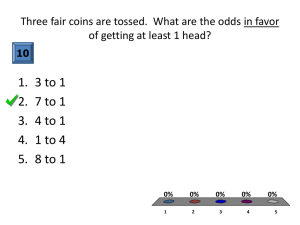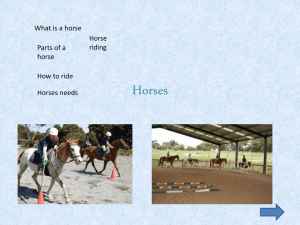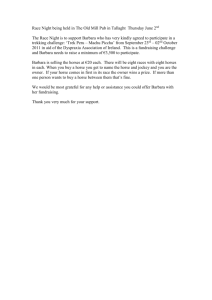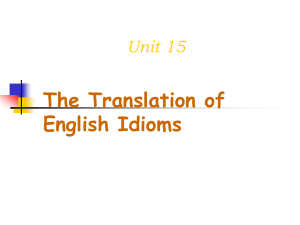Nutritional Advice for Veterans
advertisement
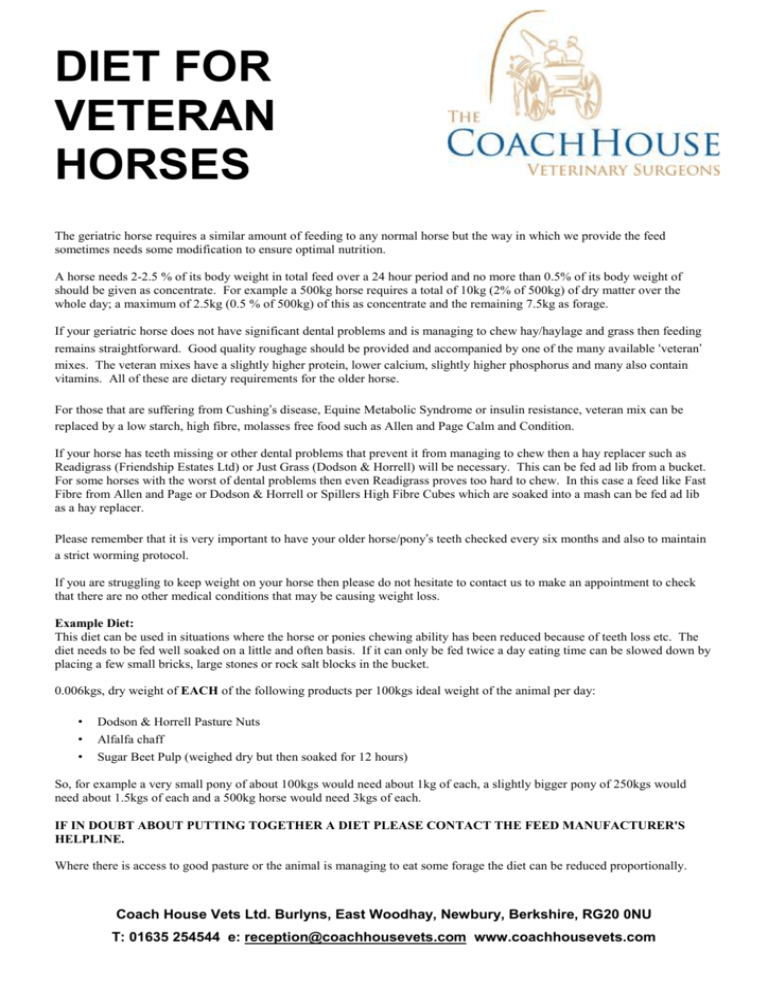
DIET FOR VETERAN HORSES The geriatric horse requires a similar amount of feeding to any normal horse but the way in which we provide the feed sometimes needs some modification to ensure optimal nutrition. A horse needs 2-2.5 % of its body weight in total feed over a 24 hour period and no more than 0.5% of its body weight of should be given as concentrate. For example a 500kg horse requires a total of 10kg (2% of 500kg) of dry matter over the whole day; a maximum of 2.5kg (0.5 % of 500kg) of this as concentrate and the remaining 7.5kg as forage. If your geriatric horse does not have significant dental problems and is managing to chew hay/haylage and grass then feeding remains straightforward. Good quality roughage should be provided and accompanied by one of the many available ‘veteran’ mixes. The veteran mixes have a slightly higher protein, lower calcium, slightly higher phosphorus and many also contain vitamins. All of these are dietary requirements for the older horse. For those that are suffering from Cushing’s disease, Equine Metabolic Syndrome or insulin resistance, veteran mix can be replaced by a low starch, high fibre, molasses free food such as Allen and Page Calm and Condition. If your horse has teeth missing or other dental problems that prevent it from managing to chew then a hay replacer such as Readigrass (Friendship Estates Ltd) or Just Grass (Dodson & Horrell) will be necessary. This can be fed ad lib from a bucket. For some horses with the worst of dental problems then even Readigrass proves too hard to chew. In this case a feed like Fast Fibre from Allen and Page or Dodson & Horrell or Spillers High Fibre Cubes which are soaked into a mash can be fed ad lib as a hay replacer. Please remember that it is very important to have your older horse/pony’s teeth checked every six months and also to maintain a strict worming protocol. If you are struggling to keep weight on your horse then please do not hesitate to contact us to make an appointment to check that there are no other medical conditions that may be causing weight loss. Example Diet: This diet can be used in situations where the horse or ponies chewing ability has been reduced because of teeth loss etc. The diet needs to be fed well soaked on a little and often basis. If it can only be fed twice a day eating time can be slowed down by placing a few small bricks, large stones or rock salt blocks in the bucket. 0.006kgs, dry weight of EACH of the following products per 100kgs ideal weight of the animal per day: • • • Dodson & Horrell Pasture Nuts Alfalfa chaff Sugar Beet Pulp (weighed dry but then soaked for 12 hours) So, for example a very small pony of about 100kgs would need about 1kg of each, a slightly bigger pony of 250kgs would need about 1.5kgs of each and a 500kg horse would need 3kgs of each. IF IN DOUBT ABOUT PUTTING TOGETHER A DIET PLEASE CONTACT THE FEED MANUFACTURER'S HELPLINE. Where there is access to good pasture or the animal is managing to eat some forage the diet can be reduced proportionally. Coach House Vets Ltd. Burlyns, East Woodhay, Newbury, Berkshire, RG20 0NU T: 01635 254544 e: reception@coachhousevets.com www.coachhousevets.com DIET FOR VETERAN HORSES If weight loss appears to be occurring despite all your efforts please contact the surgery to make an appointment. Many conditions that affect old animals can lead to weight loss and the earlier that they are detected the better. Coach House Vets Ltd. Burlyns, East Woodhay, Newbury, Berkshire, RG20 0NU T: 01635 254544 e: reception@coachhousevets.com www.coachhousevets.com


